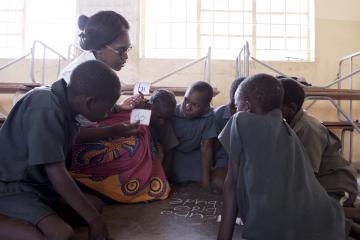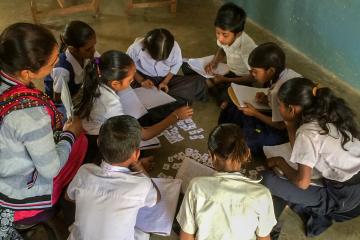
Where evidence meets practice: Inside UNICEF and J-PAL’s FLN Academy 3.0

To ensure that children in school learn to read for meaning and apply basic math, bringing together the best of both worlds—practical insights from those who work on the ground and synthesis of rigorous research from academic experts—is imperative.
This was the key message from Pia Britto, UNICEF’s Global Director of Education and Adolescent Development, at the launch of the Foundational Literacy and Numeracy (FLN) Academy 3.0 in September 2024. The event featured panelists Benjamin Piper (Program Director of Global Education, Gates Foundation) and Luis Benveniste (Global Director of Education, World Bank), who shared insights from their extensive careers in getting research-backed educational programs to work at scale.
FLN Academy 3.0 is a collaboration between UNICEF and J-PAL that supports UNICEF regional and country offices and local stakeholders in applying evidence-based solutions to advance foundational literacy and numeracy. Through this partnership, we bring together practitioners, policymakers, and researchers to exchange knowledge on what has worked to improve children’s learning.
These experts come together around problems of practice they all face in improving children’s basic reading and math skills, which form the foundations of all learning. We aim to work alongside local UNICEF offices and their partners to strengthen the global response to the learning crisis through the adoption and scaling of proven interventions.
“The philanthropic interest on foundational literacy and numeracy is relatively new but quite exciting, and I think it’s incumbent on us to think about how we can apply these programs at scale to reach more children.”
—Benjamin Piper, Global Education Program Director, Gates Foundation
The launch of FLN Academy 3.0 marked the beginning of a series of webinars on interventions for improving foundational learning outcomes that are recommended by the Global Education Evidence Advisory Panel in its 2023 “Smart Buys” report. Since last fall, we have hosted two webinars spotlighting Teaching at the Right Level and structured pedagogy. Both webinars offered attendees the opportunity to update their knowledge of evidence-based programs and engage with practitioners about implementation and scaling issues.
FLN Evidence: Teaching at the Right Level
Given the research-backed consensus on the effectiveness of Teaching at the Right Level and other tailored instruction models for accelerating FLN learning, session moderator John Floretta (Global Deputy Executive Director of J-PAL) focused his presentation on a story that not many people may have heard: TaRL’s successful adaptation from India to Zambia through a rigorous process of piloting and government-led scale-up. With the support of UNICEF and other partners, Zambia’s Catch-Up program has helped students make large gains in learning. Panelists Rukmini Banerji (CEO, Pratham Education Foundation), Titus Syengo (Executive Director, TaRL Africa), who has been working with 16 Africa countries to implement TARL, and Katharina Wuppinger (Chief Education, UNICEF Zambia Country Office) shared their unique perspectives as stakeholders at different phases in TaRL’s journey from piloting and evaluation to adaptation and scale-up.
“We learned in the process that it’s really the middle of the system that has to be the people that become the champions. If they feel the progress—if they feel that children are making progress—then many things will become easier.”
—Rukmini Banerji, CEO, Pratham Education Foundation
FLN Evidence: Structured Pedagogy
Isaac Mbiti (University of Virginia; co-scientific director, J-PAL Africa) presented evidence on structured pedagogy—the coordinated package of detailed teacher guides, student textbooks, and continuous teacher support—to show its cost-effectiveness in increasing student learning in different countries. He focused on two cases in Kenya and India, where structured pedagogy helped reduce inequality among students and sustain learning gains. Benjamin Piper, Permie Isaac (Head of Content and Training, Funda Wande), and Anustup Nayak (Project Director, Classroom Instruction and Practice, Central Square Foundation) had a lively discussion that spotlighted how essential it is for the success of implementing structured pedagogy to integrate efforts at every level of the education system.
“One of our key lessons is producing a product with the system rather than for the system. ‘For the system’ looks like: going away, designing a program, and then imposing it on teachers and schools. What we advocate for is collaboration right from the get-go and engaging stakeholders at every step. This ensures that whatever is being designed talks to the needs of the teachers in the system. This creates ownership, and ownership leads to better chances of implementation.”
–Permie Isaac, Head of Content and Training, Funda Wande
The upcoming webinars, scheduled throughout 2025, will focus on parental engagement interventions, educational technology, and applying generalizable research insights to a new context. For information on how to attend the webinars, contact [email protected]. You may watch recordings of all webinars at the FLN Hub.
Related Content

The next generation of rigorous education research: J-PAL launches the Learning for All Initiative

Applying the generalizability framework: Adopting Teaching at the Right Level in Zambia

